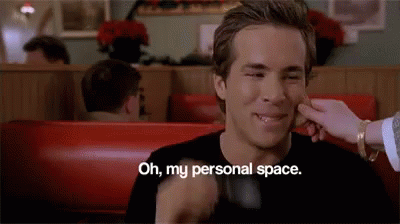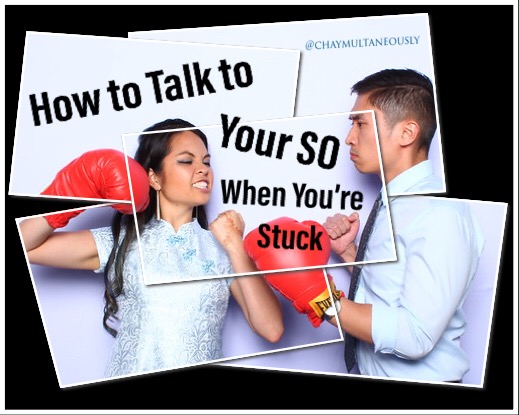How to Know If You're Taking it Personally
 |
| Photo by Kinga Cichewicz on Unsplash |
(Sidenote: Let it be known that I decided to write about this because I was taking it personally that there was a sudden drop-off in clicks on my blog. Like I've said before, when you're writing about mental health - it's important to be genuine, and *you* go *first*. So I knew I had to do something positive about it.)
So, what is "taking it personally" first of all?
"...trusting someone else to tell you who you are, instead of relying on what you know to be true about yourself; what really defines you as a person without any outside influence."
-Psychology TodayI love this definition because of its depth in simplicity: someone says something small (albeit mean), like telling you "your jacket is an ugly color" and you feel offended and hurt, as though the jacket is part of your identity and this other person is telling you who you are: strange.
It's not so strange to think that we would do this from such a small comment. We're constantly walking through the world, making meaning. We take in the crisp fall air and wrap up in our warm clothes, and we think to ourselves, "Ah, what a wonderful life!" or "God, it's f*cking freezing I hate this," or "The holidays are coming, I'm so stressed" -- all thoughts cascading through your mind from a seeing few leaves falling and breathing the surrounding air.
Taking It Personally, then, is meaning-making at the farthest end of the spectrum, when it comes to social interactions. When someone says something, you create the meaning: "This is about me" and usually it feels pretty uncomfortable.
Signs You May Be Taking Something Personally
Physical Reaction
This is something I try to pay attention to the most, because I tend to ignore how my body feels - I imagine many of you are the same. Your body is always telling you something... if you pay attention, you might find that you're noticing more things in the world than you realized.
For example, you're talking to your friend, and they make a joke at your expense. You laugh along, knowing that is the socially acceptable response, until it hits you - sometimes you can feel it physically in your chest or your stomach or your face. Something hits a chord inside you.
Next time something happens that makes you uncomfortable, shocks you, or sends you into that place of "wtf" - pay attention to where you feel it in your body. Some of my kids have told me that they actually feel it in their fists, so while the center of the body is most common, you could be noticing it in different places than others.
Defensive Comments
This is reaaaally common y'all. I can't tell you how many times you can pass people on the street or sit in a room for a few minutes without hearing someone make some kind of defensive comment. They're everywhere! Once you start to notice what they really are - you'll start to see the world (and yes, yourself) with waaaay more context.
So what's a defensive comment?
- You try to explain/excuse the behavior someone is criticizing or commenting on as something reasonable or understandable, without taking any responsibility for it.
- You turn it on the other person, saying that they were the cause or bring up a trait or past behavior of theirs that is somehow comparable (however far-fetched in your defensive mind) to what you did.
Your girlfriend says, "What is this doing on the floor, I thought I told you to pick this up!" And your reaction is, "God I was so tired last night (Defensive #1), why can't you just give me a break (Defensive #2)!"
Your boss says, "I'm not seeing your projects come in on time, is there something you're not telling me?" And you say, "I'm still waiting on some other people to get back to me, I'll email them again but yeah I mean I've been telling them for ages so I mean maybe you should ask them (#1)."
Your dad says, "You're not listening to me, I've been telling you to get started on these investments for ages, when are you gonna learn?" And your reaction is: "Clearly never, since that's what you wanna hear (#2)!"
You get the idea. Obviously they shouldn't be talking to you like that either. But you can only control your own behavior, yeah? Yeah.
Avoidance
This one is often used the most among my family and friends (myself included). If someone was hurt by a comment or felt badly after an interaction, why go through the same pain again? Let's all avoid each other until this blows over!
The funny thing is, all of these reactions have a healthier counterpart... something that we actually do need. The flipside of the coin, if you will.
So... how... do we get the nice, hero-we-need side and not the charred, zombie-looking, villain-we-deserved side?
Well, it's easier once you've identified it - because all you have to do is correct it. I mean, why re-invent the wheel? Just work with what you already have in front of you!
If you tend to be avoidant: give yourself space and a time limit.
Your limit is dependent on your tolerance for going away and then coming back to a difficult talk. 5 minutes. 10 minutes. 3 hours. 1 day. Whatever it is, when your timer is up, it's time to return to the issue at hand. Thinking this over, parsing out what was about you and what was totally an innocent comment or a genuine request, and then coming back to the person in an environment that is safe for you both. If you find this too difficult, writing out what you're upset about or talking it out with a trusted friend will help you figure out what to do next.
If you tend to be defensive: ask for the chance to re-explain.
When you're defensive, you feel as though you're not being seen or heard. You might start off as being accusatory or pushing the blame off on others, but if you take another try and start with something like: "From what you're saying, I know you're disappointed in me - let me explain where I'm coming from, and how I'm feeling too, and then we can both figure out how we can prevent this in the future."
Take responsibility for YOUR part and your part ONLY. Going overboard on the other side, "This is all my fault, everything is always my fault you're so great and you don't deserve a loser like me" is also really hurtful to you and to them, and a manipulative way of talking through your problems. I say this as someone who has said that to other people like 100 times. Trust me when I say it never, ever helps.
If you notice your body's physical reactions: lean in to them!
Your stomach hurts. Your face is hot. Focus all of your attention on it, intentionally. Be with your body for a minute. Then move it. Splash your face with water, take a walk, get a drink of water. Give your body the attention it deserves, so you can come back to this moment and either let it pass because it's not worth your time, or speak from your heart rather than your walls.
You get the idea. Obviously they shouldn't be talking to you like that either. But you can only control your own behavior, yeah? Yeah.
Avoidance
This one is often used the most among my family and friends (myself included). If someone was hurt by a comment or felt badly after an interaction, why go through the same pain again? Let's all avoid each other until this blows over!
The funny thing is, all of these reactions have a healthier counterpart... something that we actually do need. The flipside of the coin, if you will.
- Physical Reaction = Mind-Body Connection
- Defensive Comment = Asserting Boundaries
- Avoidance = Space
 |
| yikes bro |
Well, it's easier once you've identified it - because all you have to do is correct it. I mean, why re-invent the wheel? Just work with what you already have in front of you!
If you tend to be avoidant: give yourself space and a time limit.
Your limit is dependent on your tolerance for going away and then coming back to a difficult talk. 5 minutes. 10 minutes. 3 hours. 1 day. Whatever it is, when your timer is up, it's time to return to the issue at hand. Thinking this over, parsing out what was about you and what was totally an innocent comment or a genuine request, and then coming back to the person in an environment that is safe for you both. If you find this too difficult, writing out what you're upset about or talking it out with a trusted friend will help you figure out what to do next.
If you tend to be defensive: ask for the chance to re-explain.
When you're defensive, you feel as though you're not being seen or heard. You might start off as being accusatory or pushing the blame off on others, but if you take another try and start with something like: "From what you're saying, I know you're disappointed in me - let me explain where I'm coming from, and how I'm feeling too, and then we can both figure out how we can prevent this in the future."
Take responsibility for YOUR part and your part ONLY. Going overboard on the other side, "This is all my fault, everything is always my fault you're so great and you don't deserve a loser like me" is also really hurtful to you and to them, and a manipulative way of talking through your problems. I say this as someone who has said that to other people like 100 times. Trust me when I say it never, ever helps.
If you notice your body's physical reactions: lean in to them!
Your stomach hurts. Your face is hot. Focus all of your attention on it, intentionally. Be with your body for a minute. Then move it. Splash your face with water, take a walk, get a drink of water. Give your body the attention it deserves, so you can come back to this moment and either let it pass because it's not worth your time, or speak from your heart rather than your walls.
Hope this helps - Thanksgiving is tomorrow, and I am so very grateful for every single one of you... thank you, thank you for being here, for reading, for wanting to be a better person every day, I appreciate YOU!












Comments
Post a Comment